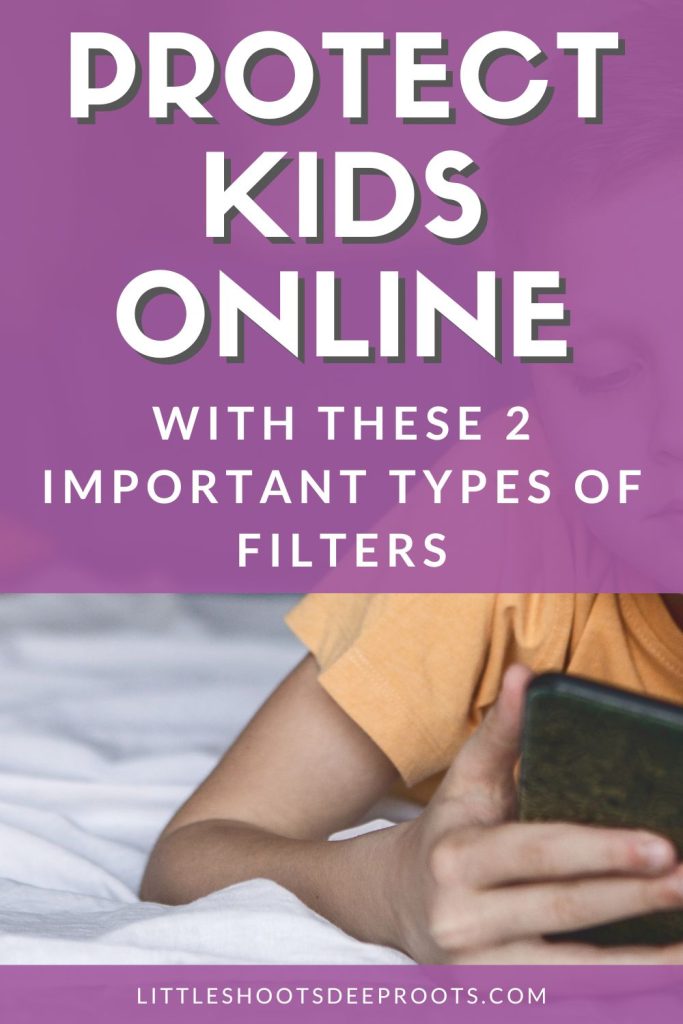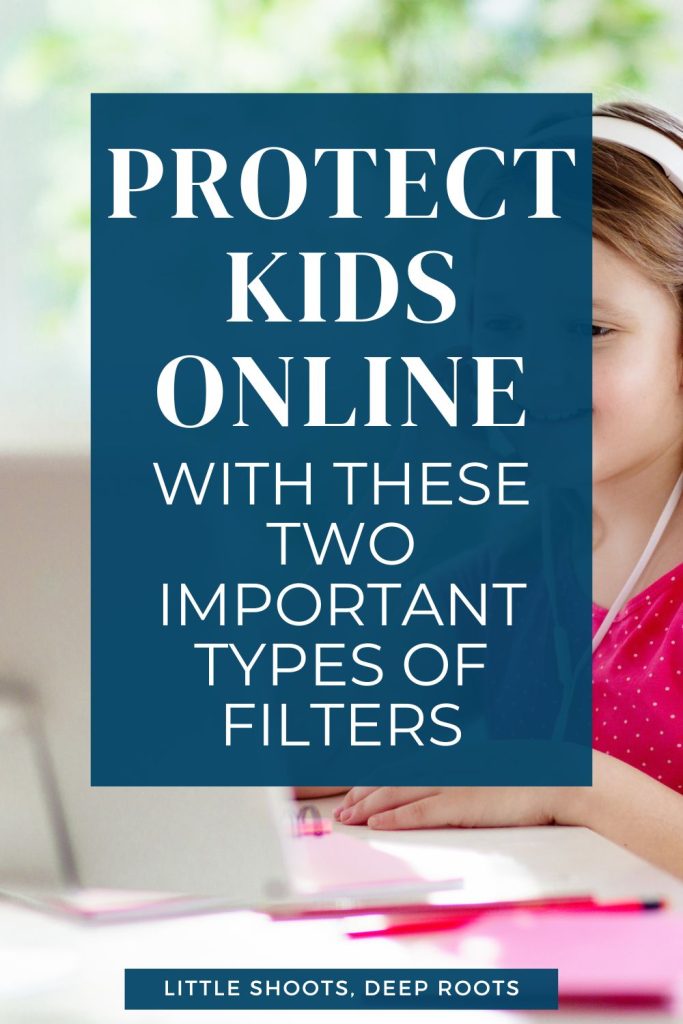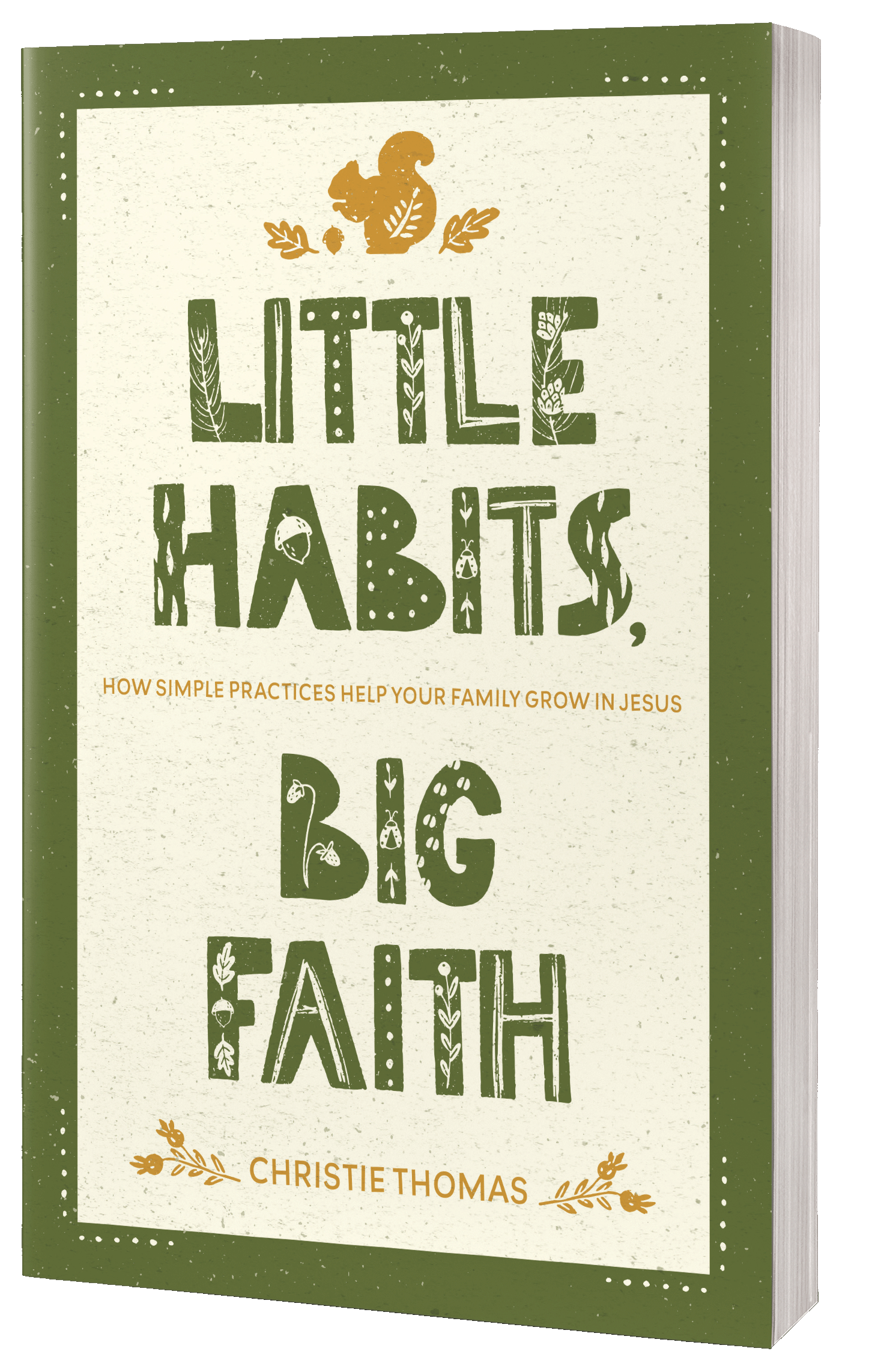There are 2 very specific things we need to do to protect kids online, and digital filters are only ONE of them.
As we pulled into the underground parking garage, our 8-year-old’s voice piped up from the backseat. “When I was on my Chromebook at school I saw a thing that said ‘Are you single?’ and ‘our girls are very attractive.’”
We glanced at each other, eyebrows raised, while my husband carefully parked. Would we respond with fear? My heart was certainly pounding wildly.
“What did you do about it?” I asked, sounding a lot calmer than I felt.
“I told my teacher.”
“Did you see anything else?”
“No.”
A few deep breaths later, we unbuckled and gave him hugs. We assured him that he had done the right thing by telling his teacher, and by telling us.
Over the next several days we connected with his teacher and the principal several times, as it appeared that our son had stumbled upon an unsafe search engine that also installs malware on devices.
We learned two valuable lessons from this experience.
- Our educators care about our children, but they can’t watch over every child’s shoulder, every moment they are online.
Not only can our teachers not know what each child is doing every single moment, but most of them are not equipped to deal with possible problems. If our son had not reported this incident, other kids may have been pulled into something much more nefarious before it got fixed. In general, teachers are ill-equipped to be our children’s internet nanny, not because they do not want to protect our kids, but because they simply cannot do everything. Even if they were fully trained on every issue that could come up, no one can be everywhere, always. - It is up to us, as parents, to ensure that our children know how to identify and deal with the strange things that pop up online.
We can set up filters and rules until our children are protected from all things dangerous online when they’re at home. But all it takes is an internet-savvy teenager or friend on the school bus or a trip to a friend’s house to access an entire world of online predators, pornography, and bullying. Without an internal filter in place, our son would not have had the ability to report his strange search result to his teacher, and to us.
Make no mistake: children can, and currently are, becoming addicted to pornography.
No parent wants their child to become addicted, but it happens.
These are children from homeschools, Christian schools, and public schools, with parents that use filtering software and parents that don’t. There are no dividing lines between income, or even gender when it comes to the havoc that pornography is wreaking on our children’s lives. It must be stopped, and it can only be stopped when parents look the issue head-on and say “you will take NO MORE of our children.”
But what can you and I do, as moms, to protect our kids from online pornography? It’s such an enormous problem that it can cause us to feel paralyzed.

The 2 types of filters you need to protect kids online:
1. EXTERNAL FILTERS
We must set up external filters. This includes turning on “Safe Search” and restrictions on YouTube, teaching our children to use kids-safe search engines (like www.kiddle.co), and installing filters. These external filters will generally help keep our kids from accidentally finding things their little eyes should not see.
[HELPFUL SITE: Bookmark the Protect Young Eyes website for updated lists of how to turn on parental controls on various apps and devices.]
As far as external monitoring software, we did initially buy the “Circle”, but it seems to be discontinued. We stopped using it because it slowed down our internet speeds too much and currently use the parental controls on our Google Home wifi router.
[Again, I recommend checking the Protect Young Eyes website because they keep up-to-date on the best routers for families.)
2. INTERNAL FILTERS
But because, as my husband says, “you cannot solve a technology problem with more technology,” we must also help our kids develop internal filters.
Why internal filters? Because…
- external filters break or are hacked by intelligent kids.
- the pornography industry thrives on addiction and is constantly looking for ways to circumvent filtering software.
- safe search and restrictions can be turned off by a motivated child. Spying on our children’s online habits is not the answer, because it creates mistrust and makes our children internally work harder to hide their online activities. As parents, we need to act as coaches to help our kids develop a strong internal filter.

How can we coach our children, helping them develop this internal filter?
A. Have honest, frank conversations about what it means to protect our minds.
My favorite resource for opening this conversation is a book called Good Pictures, Bad Pictures. It teaches about the science of addiction at a very child-friendly level, and helps kids know what to do if they see “bad pictures”. To protect little minds, it describes “bad pictures” as being ones that contain people with no clothes on (rather than actually describing pornography). We started reading this book with each of our boys when they were in first grade, thereby opening up that topic of conversation.
Books like this can open the doors of conversation so that our kids know we are a safe place to talk about awkward topics.
See “Good Pictures, Bad Pictures” on Amazon.
B. Teach them healthy online habits.
This is the trickiest part because even adults have a difficult time identifying healthy online habits. Frankly, it takes wisdom to develop these and we need to grow in wisdom ourselves!
Here are several conversations you could (and probably should) be having with your child:
a) The internet encourages us to see others as pixels instead of people.
Our children need to be constantly reminded that the internet is made of real human beings! This has both positive and negative ramifications:
- Everyone on the internet has real feelings. Something that would be hurtful when said in person is still hurtful when said online. Everyone on the internet is loved by God and worthy of respect, therefore what we share needs to reflect that. That means we don’t speak unkind words to others and we don’t ask for nude pictures of classmates. Neither of those show respect for Image-bearers of God.
- Not everyone on the internet is safe. Just like in real life, when you wouldn’t accept candy from a stranger or get into a stranger’s car because they might want to hurt you, there are people on the internet who aren’t healthy. Often, people pretend to be someone else on the internet so that they can hurt others. That means we don’t share personal information, like where we live or what school we attend. We don’t plan to meet up with someone we haven’t met in real life, and we don’t send nude pictures of ourselves to anyone.
b) The internet encourages us to overshare.
Personal information is just that: personal. But we often forget that and share WAY too much online. This gets us (and our kids) into tricky situations. It’s important to talk with your kids about WHAT is considered private or personal information (medical history? workplace? school?).
c) The internet encourages disconnection.
While we may be connecting with people online, we can see that our society is becoming disconnected. We sit in the same room, scrolling Instagram rather than actually connecting. It’s important for our children to know that we are a family and that as parents, we are safe people to talk with about anything. We can’t just say this once and expect our kids to trust us. We have to connect with them in positive ways every day, building those bonds of trust so they can see what healthy relationships look like.
If you need help starting these conversations, Google has created a fantastic tool for children in early elementary. It’s a computer game that teaches many of these internet smarts. But here’s the key:
Don’t just turn it on and expect your child to “get it”. You need to play the game WITH your child, instructing them on the “why” as the game teaches the “what” and the “how”.
See how it keeps coming down to intentional connection and conversations??
You can check out the game here.

It might be easy to say that what my son found online was the exception, rather than the rule, but we both know that is not true.
So what are we going to do about it?
Will we, as parents, stick our collective heads in the sand? Or will we band together to help each other come up with creative solutions to this online epidemic?
The choice is ours. Our children’s social, emotional, spiritual, and physical lives hang in the balance. What will we choose?
Other articles to help you protect kids online:
Talking about sex, pornography, and abuse with your kids





Thank you so much for these tips! My kids are still young so we haven’t got to this point yet. But, it’s definitely something I think about a lot. Especially with a world getting more and more corrupt by the minute. I’m going to pin and bookmark this for later on down the road.
Thanks for stopping by Sarah! I really think that when we trust in God’s redemptive plans and rely on His wisdom, this doesn’t have to be nearly as scary as Facebook would make it seem! God bless. 🙂